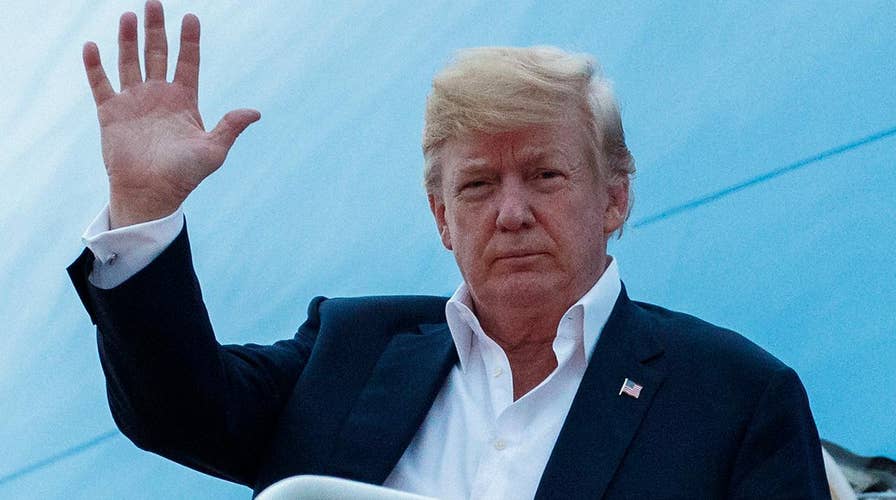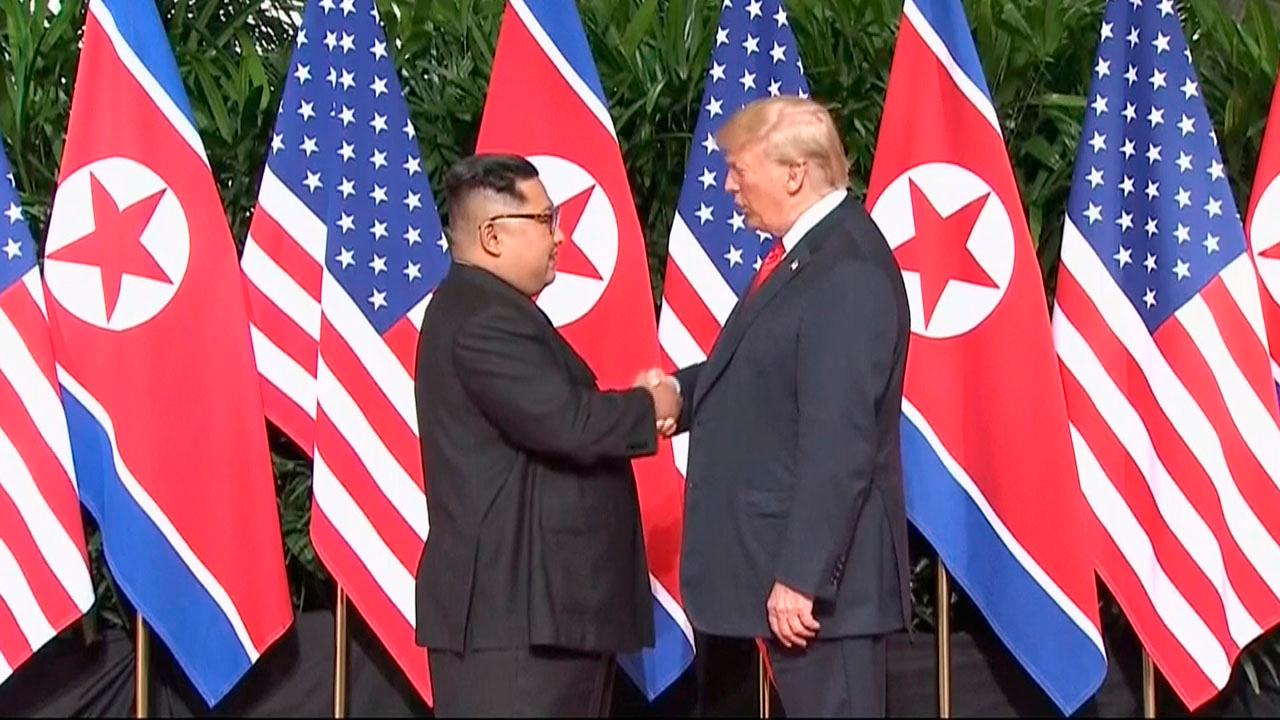Trump back at White House after North Korea summit
President Trump says North Korea is no longer a nuclear threat. Kevin Corke reports from the White House.
The Singapore summit was quintessentially Trumpian – a made-for-TV spectacular, long on red-carpet pageantry and short on substance. It was also Trumpian in another sense: both President Trump and North Korean leader Kim Jong Un made vague pledges they can easily ignore should follow-on talks falter.
President Trump expressed optimism Wednesday about the outcome of the talks, tweeting: "Just landed - a long trip, but everybody can now feel much safer than the day I took office. There is no longer a Nuclear Threat from North Korea. Meeting with Kim Jong Un was an interesting and very positive experience. North Korea has great potential for the future!"
And the president added in a follow-up tweet: “Before taking office people were assuming that we were going to War with North Korea. President Obama said that North Korea was our biggest and most dangerous problem. No longer - sleep well tonight!”
In the best-case scenario, the summit that took place Tuesday was the beginning of a challenging, more traditional diplomatic process that could yield results America has long sought. These results include a denuclearized North Korea without intercontinental ballistic missiles threatening the American homeland, and a North Korea living in peace with democratic American-allied South Korea.
But there is a worst-case scenario as well. If U.S.-North Korean negotiations fail, the Trump-Kim summit will be seen as a glorified PR stunt, hyped by the media and aimed simply at boosting each leader’s political standing at home.
To President Trump’s credit, his “maximum pressure” sanctions on the North and the reversal of his bellicose rhetoric may have helped push Kim to Singapore so that his intentions could be explored.
Thanks also to diplomatic support from South Korean President Moon Jae-in, President Trump was able to stage not only an unprecedented meeting, but secured a pledge to recover and repatriate the remains of some 5,000 American soldiers missing in North Korea since the Korean War ended with an armistice in 1953.
But was the summit truly historic, meaning changing the course of history? Was it a turning point in North Korea’s nuclear aspirations, its provocations, or its brutal repression at home? What this face-to-face meeting appears to have done so far is enable President Trump to put Kim to the test.
After this initial round, Kim has emerged the apparent winner. At least in the short run, “Chairman Kim” – as President Trump deferentially called the brutal, 34-year-old dictator – has reason to smile.
First, Kim paid little, financially or politically, for the legitimation he so desperately craves. Driven to the meeting in his armored Mercedes, he flew home in his Chinese-supplied jet with Singapore picking up his hotel tab and what the Wall Street Journal called his “place on world stage” cemented.
Second, Kim got security guarantees for his odious regime, and by implication, the preservation of his own role as the greatest of his impoverished country’s supreme leaders.
Third, Kim pocketed the cancellation of the joint U.S.-South Korean military exercises that President Trump called “provocative,” expensive (read waste of money) "war games."
What Kim wanted but did not get was an immediate lifting of economic sanctions on his country.
What did President Trump get at the meeting? A photo-op seen (and mostly praised) around the world. His main achievement was an even emptier nuclear disarmament pledge than those Kim’s predecessors made in 1994 and 2005 and violated.
The communique agreed to by President Trump and Kim Jong Un speaks not of denuclearization, but of a commitment to “work toward” complete denuclearization of the Korean peninsula. How and when this would be achieved or verified is yet to be determined.
Only days before the summit, President Trump and his senior aides insisted that Kim’s denuclearization be “complete, verifiable and irreversible.”
President Trump said at his press conference in Singapore that Kim would allow inspectors to verify that Pyongyang had destroyed, dismantled, or decommissioned the estimated 141 sites devoted to the production or use of unconventional weapons in a mountainous country the size of Pennsylvania. But the absence of any reference to verification in the communique struck Korean experts as ominous.
“Chances are we’re basically back to the same old rodeo with North Korea,” said Michael J. Green, President George W. Bush’s senior director for Asia on the National Security Council staff. “North Koreans have declared they’re a nuclear weapons state in their constitution. Kim Jong Un declared that they’ve achieved nuclear weapon status.” Despite previous similar pledges, he said, Pyongyang continued testing nuclear weapons.
Unless Trump & Co. push hard behind closed doors, we may have to bid farewell to the insistence on CVID – complete, verifiable, irreversible denuclearization.
The summit was unprecedented in another respect. It marked a reversal of traditional diplomacy in which allies are rewarded and enemies held at bay.
At the Singapore summit and the disastrous G-7 meeting of allied industrial nations in Canada, President Trump held an American enemy close and dissed longstanding friends.
The back-to-back summits were a Kiss Kim, Kick Canada, Alice-in-Wonderland extravaganza that unnerved America's allies, particularly South Korea. President Moon was not informed in advance of President Trump’s agreement to suspend joint military exercises with South Korea, according to Sue Mi Terry, a Korea expert at the Center for Strategic and International Studies.
Secretary of State Mike Pompeo arrived in the South Korean capital of Seoul Wednesday to try to undo the diplomatic damage and assure President Moon that America’s alliance and its security guarantees to his country remain intact.
It is much too soon to declare the summit a failure, as some commentators have done. Since talks to implement the declaration are expected to begin within a month, we will soon know Kim’s true intentions. I, unlike many other Trump critics, hope that the president’s radically new approach to handling this untested Korean autocrat will succeed. But skepticism is obviously in order.
President Trump did win at least one new fan in Singapore. Retired NBA Hall of Famer Dennis Rodman, who has visited Kim in North Korea, praised President Trump for the summit, noting tearfully that Barack Obama never had time for him.
Wearing a red “Make America Great Again” baseball cap, Rodman claimed credit for making the summit happen.
"Today is a great day for everybody, Singapore, Tokyo, China, everything,” Rodman told a TV anchor.
Maybe one day Rodman will be able to buy one of those North Korean beach condos that President Trump showed Kim on his iPad. Given North Korea’s record, however, renting may be a safer bet.


